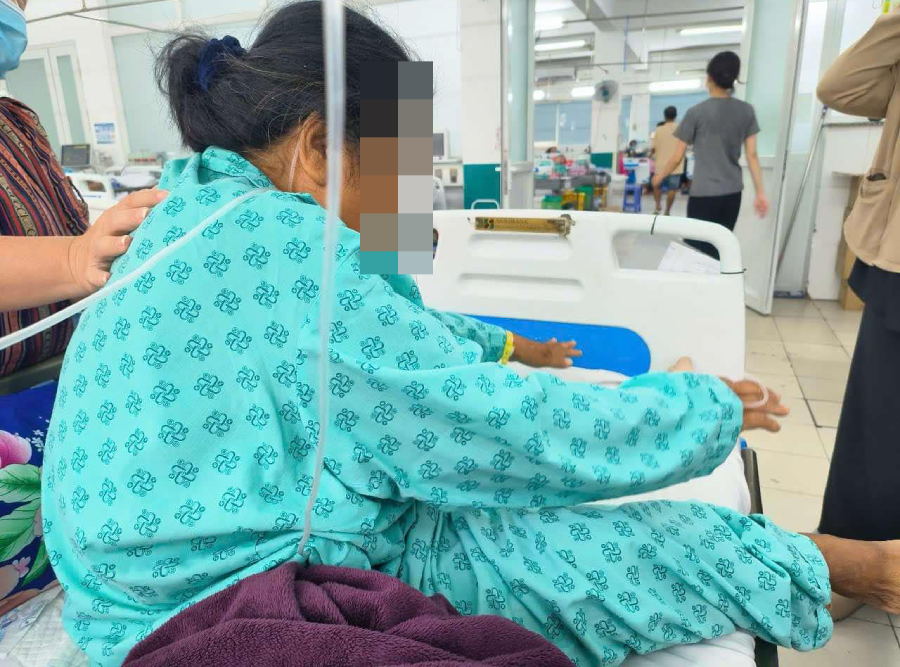
Patients have to pay for medical examinations and interventions. The money may come from patients themselves, or health insurance, yet in some instances where patients lack funds, doctors still opt to "save lives first, get fees later".
At Thu Duc City General Hospital in HCM City, Dr Le Duy Lac, Specialist Level 2 and Head of the Cardiovascular Intensive Care Unit, noted that patients who cannot pay are common at the hospital.
Many workers are brought to the emergency room in life-threatening conditions, and when asked about hospital fees, their relatives respond: "We don’t have any." As a result, the practice of providing emergency care first and gettings fees later occurs frequently.
Dr Le Duy Lac vividly recalled the case of N.T.N.T, a lottery ticket seller, who was living in a rented room in Thu Duc City. The patient was brought in for emergency care late at night, suffering from chest pain and difficulty breathing. Doctors diagnosed her with an acute myocardial infarction, requiring mechanical ventilation, with a high risk of death that very night.
"The patient’s husband was a frail, elderly man. When I explained his wife’s conditions and said the patient needed intervention, but the success probability rate was 50/50,” he recalled.
When asked if the patient’s family could afford the intervention operation, the man said, “Save her, please”. He showed little embarrassment and said: “I don’t have money.”
The couple, childless, sustained themselves by renting a room and selling lottery tickets. Their earnings barely covered daily expenses and rent. Upon arriving at the emergency room, she had just received 150 lottery tickets to sell the next morning. Unable to return the tickets and lacking funds, the husband could not decide what he needed to do.
At that moment, Lac still decided to make an intervention to save the woman’s life, though the patient had not paid money.
“I contacted the social work division to ask for help and told the old man to bring 150 lottery tickets to the hospital, where doctors and medical workers will buy for him,” Lac recalled.
Twenty minutes after Dr Lac posted the news about the patient, all 150 lottery tickets were sold. The money was handed to the husband to help cover his wife’s hospital fees.
That same night, many benefactors promised to provide financial support to run the surgery, while the social work division continued to call for funding stent placement. Fortunately, the woman’s life was saved.
Saving lives first
Dr Lac shared that a physician’s duty is to save lives in all circumstances. Many patients who are hospitalized are freelance workers with unstable living situations, making it difficult for them to afford health insurance.
Dr Nguyen Huy Thang from People’s Hospital 115 in HCM City emphasized that saving lives is the top priority. However, many patients, after receiving emergency care, leave without paying fees, particularly those without relatives.
In late February, doctors from the Vascular Pathology Department performed a blood reperfusion procedure for a lottery ticket seller who suffered a stroke, which cost VND80 million. The patient had neither money nor health insurance.
“They did not have money, even a small sum of VND100,000. But we had to save them first and ask about money later. Some days later, the patient regained consciousness and left the hospital without paying any dong,” Thang said.
In such cases, the hospital faces budget deficits, or doctors personally cover the cost.
Many have questioned why hospitals don’t retain identification documents or involve the police to track down patients. These queries often remain unanswered, yet doctors continue to "take the risk" of signing off on treatment without waiting for relatives or payment.
"Repeatedly asking philanthropists for help makes us hesitate, so we end up using our own money to assist patients. The only consolation is seeing them recover and return to life," Dr Thang shared.
Thang said like other hospitals, People’s Hospital 115 often receives such patients and they always choose to save patients first.
"If we wait for administrative procedures to be fulfilled before making intervention, patients will lose the chance to be saved. If the golden chances are missed, everything will be nonsensical, even if patients’ relatives can pay big money,” Thang explained.
In many cases, doctors consider using the equipment donated by manufacturers, to help cut down the expenses poor patients have to pay and increase the life opportunities for patients.
Phuong Thuy